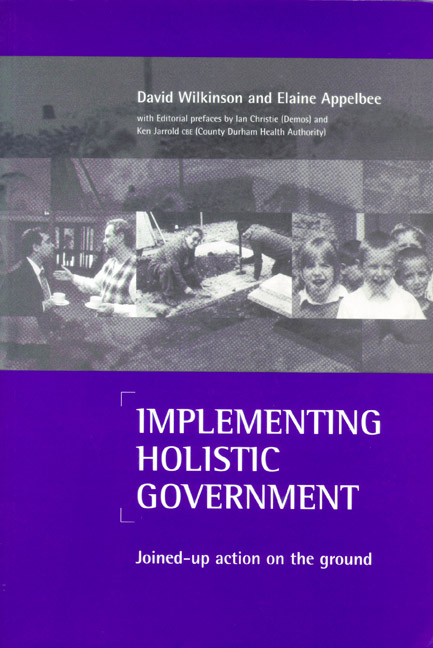Book contents
- Frontmatter
- Contents
- Editorial preface
- Editorial preface
- Acknowledgements
- Summary
- 1 Setting the context
- 2 The functional inheritance and its consequences
- 3 The public service, community interface
- 4 Change that works – sustaining community and quality of life improvement
- 5 Change that works – sustaining organisational and whole system change
- 6 Developing the middle ground: where bottom-up meets top-down (a third way for local governance?)
- 7 Improving sustainable quality of life: the benchmark for Best Value
- 8 Joined-up action on the ground: six key issues that have to be addressed
- 9 Working in the middle ground: recommendations to promote joined-up action on the ground
- References
Editorial preface
Published online by Cambridge University Press: 05 July 2022
- Frontmatter
- Contents
- Editorial preface
- Editorial preface
- Acknowledgements
- Summary
- 1 Setting the context
- 2 The functional inheritance and its consequences
- 3 The public service, community interface
- 4 Change that works – sustaining community and quality of life improvement
- 5 Change that works – sustaining organisational and whole system change
- 6 Developing the middle ground: where bottom-up meets top-down (a third way for local governance?)
- 7 Improving sustainable quality of life: the benchmark for Best Value
- 8 Joined-up action on the ground: six key issues that have to be addressed
- 9 Working in the middle ground: recommendations to promote joined-up action on the ground
- References
Summary
The Labour government's aims for a radical modernisation of Britain, and especially for a fundamental attack on the causes and consequences of poverty, crime and chronic unemployability, depend on its ability to make a reality of the idea of ‘holistic government’. This notion – better known as ‘joined-up thinking’ and ‘joined-up policy’ – has become a soundbite and is in danger of being seen as a cliché with no substance. But it is at the heart of the government's ambitions to go down as a radical reforming administration.
Holistic government is about achieving substantially better outcomes across a wide range of policy areas in which we have become accustomed to fatalism and underperformance. Successive governments have failed to tackle deep-seated problems of poverty and all the associated ills known as ‘social exclusion’ on our worst council estates; they have presided over a steady decline in the performance of public transport systems; and they have failed to raise levels of educational attainment, environmental quality and health for the worst-off parts of society.
Overcoming the legacy of fatalism and low expectations about the scope for progress in these areas and actually achieving better outcomes on a large scale is not simply a matter of unlocking more public money or drawing up better legislation. It requires a cultural revolution in central and local government, and a new way of looking at policy design and implementation. This is what holistic government is about.
Why do we need this revolution? The key reason is that many costs are incurred, and many problems exacerbated, because of failures of coordination and communication between departments and agencies at central and local levels. The joined-up quality of problems – those experienced, say, by elderly people with no relatives to care for them, or by disaffected young people with poor local schools and troubled families – is not reflected in joined-up policy and service delivery. Tackling complex and deep-seated problems of urban regeneration and social exclusion demands far better collaboration between public bodies, and between them and the private and community sector, than we have become used to.
Holistic policy making and implementation of joined-up solutions will require a cultural revolution in four key respects.
- Type
- Chapter
- Information
- Implementing Holistic GovernmentJoined-Up Action on the Ground, pp. v - viPublisher: Bristol University PressPrint publication year: 1999



